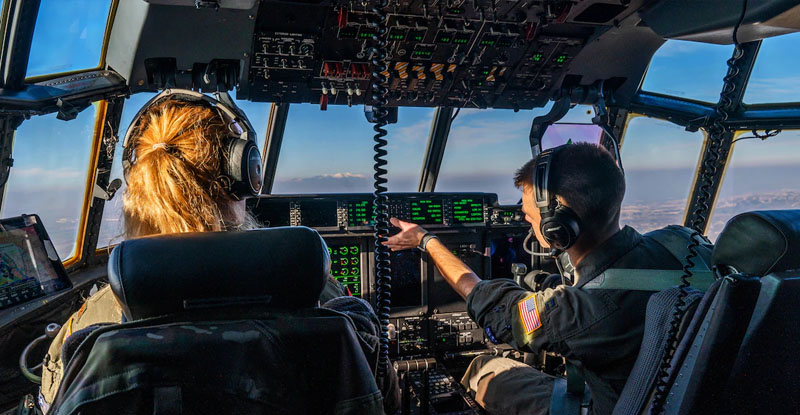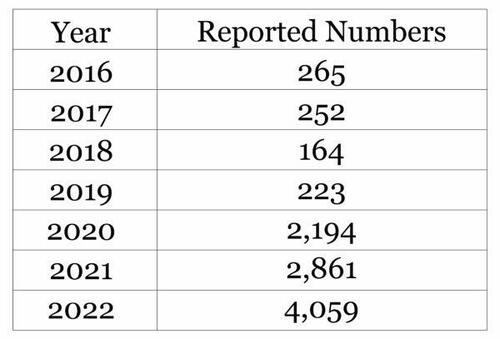It’s been a year since four Department of Defense (DOD) whistleblowers found a sudden increase in various diseases in the Defense Medical Epidemiology Database (DMED), which coincided directly with the introduction of COVID-19 vaccinations. Now, new data shows more evidence.
That’s according to Lt. Col.Theresa Long, M.D., MPH, a board-certified aerospace medicine doctor and Army Brigade flight surgeon with specialty training as an aviation mishap investigator and safety officer, who was one of the four whistleblowers. Long’s background has uniquely equipped her to recognize what she described as “unusual diagnoses and alarming trends only after the introduction of the COVID-19 vaccinations.”
Long said what she has now found has led her to file yet another whistleblower complaint with Sen. Ron Johnson’s (R-Wis.) office. She described this data as “more alarming DMED data” after she “went back into the ‘fixed’ DMED again to look for signals of harm for Army aviation.”
“What I found was a clear signal, that something in 2021 changed the health of service members,” Long told The Epoch Times. She said these signals were consistent with those in the Vaccine Adverse Event Reporting System (VAERS) reports. But unlike VAERS reports, DMED data showed spikes in the number of diagnoses “made by a healthcare professional within the DOD on service members.”
According to the Military Health System, the DMED provides remote access to a subset of data contained in the Defense Medical Surveillance System (DMSS). The DMSS contains up-to-date and historical data on diseases and medical events (including reportable events) and “is available to authorized users such as U.S. military medical providers, epidemiologists, medical researchers, safety officers or medical operations/ clinical support staff for surveying health conditions in the U.S. military.”
“After querying all pilots across the DOD, for all-cause morbidity and mortality, I found a stunning increase in the number of reportable events, spiking from an average of 226 reportable events a year (2016-2019) to 4,059 reports in 2022,” she explained.
A DOD reportable event is any patient safety event resulting in death, permanent harm, or severe temporary harm—and all require a comprehensive systematic analysis and a follow-on corrective action implementation plan report.
“The point is there is a statistically significant increase in death, permanent harm, or severe temporary harm in young healthy fit pilots,” she continued.
Such injuries were more obviously shown in this population. Because aviation pilots are required to have a superior level of health and fitness, and their health conditions are under more strict monitoring, according to Long.
What spurred Long on to pull this second round of data was when she learned the Federal Aviation Administration (FAA) had quietly made changes to the acceptable parameters of PR intervals (representative of the first part of a heartbeat, measured in seconds or milliseconds) on electrocardiograms of pilots. The FAA didn’t respond with research and data to support their decision, according to Long.
Those actions led to the press release dated Jan. 27, 2023 from Johnson in a letter to the FAA, where he stated the following details:
“Based on data from the Defense Medical Epidemiology Database, the whistleblower [Theresa Long] reported that the total number of disease and injuries [reportable events] in pilots across the DOD was 265 in 2016, 252 in 2017, 164 in 2018, 223 in 2019, 2,194 in 2020, 2,861 in 2021, and 4,059 in 2022.”
Johnson also told The Epoch Times these statistics “raise questions as to whether FAA has seen similar increases in disease and injuries in individuals in the aviation industry.”
Long noted that in the “post-glitch” DMED, the number of reportable events across the DOD had gone from a four-year average (2016-2019) of 40,813 to 110,000 in 2020 to over 200,000 in 2022.
“Some would ask why the numbers start increasing in 2020, you have to remember the Pfizer/DOD study with 43,448 participants started on July 27, 2020.”
Long emphasized that her opinions do not reflect those of the Army or the DOD.
Looking back, she said it was after being stonewalled for answers regarding adverse events from the COVID vaccine that she began performing queries in the DMED. She wanted to know if what she was seeing within her brigade were isolated anomalies or part of a wider disaster unfolding. . . . . (read more on Zero Hedge)









Leave a Comment